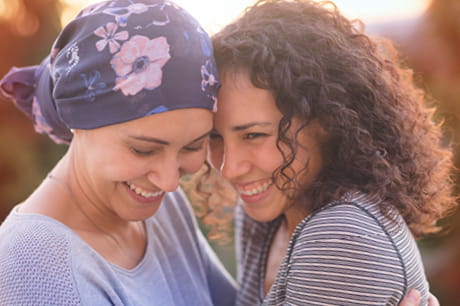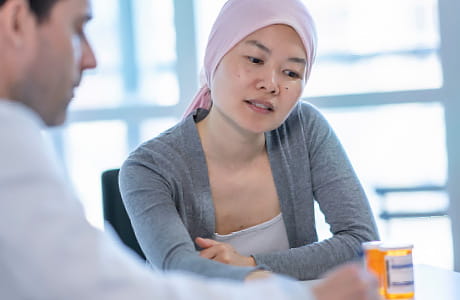How breast cancer treatment affects your health
When you’re having breast cancer treatment, knowing what changes to expect and how to best manage them can make a big difference in how you feel physically and mentally.
The latest diagnostic technology can help detect breast cancer earlier and pinpoint treatments, so you have fewer unpleasant side effects. But the treatments you and your doctor choose can still affect your short- and long-term health.
Side effects of breast cancer treatment
Different breast cancer treatments have different side effects. You can have certain symptoms while you’re undergoing procedures, while some symptoms may last long after that last treatment.
“Navigating through breast cancer treatment options is a complex and personal decision,” says Fiori Alite, MD, a Geisinger radiation oncologist specializing in breast cancer therapy. “It’s important to have a discussion with your doctor about all the treatment options and potential side effects.”
Depending on your treatment, you may have different health issues. Fatigue is a common symptom with many of the treatments described below.
Surgery
Lumpectomy and mastectomy are two surgical procedures to treat breast cancer.
A lumpectomy removes smaller tumors in the breast, and possibly some tissue surrounding the tumor to prevent the cancer from recurring.
A mastectomy removes the entire breast, including the area of the tumor containing cancerous cells. “Genetic testing, such as BRCA gene status, is often important in making decisions regarding which surgery to pursue,” adds Dr. Alite.
You may need lymph node surgery, depending on your diagnosis. This involves the removal of one or several lymph nodes near your armpit that sometimes harbor breast cancer cells.
Some side effects from these procedures include:
- Scarring
- Swelling or lymphedema
- Pain
- Lack of mobility at surgery site (lymph node surgery)
Your cancer team will watch for the development of these side effects. Often, a physical and occupational therapist will help improve lymphedema, pain and shoulder mobility.
Chemotherapy
Chemotherapy is the use of several cancer-fighting medications to remove cancer cells in the body. Chemotherapy can be delivered intravenously, orally, topically or as an injection. This treatment affects your entire body because the medication travels through your bloodstream to fight the cancerous cells.
Chemotherapy is used to treat many types of cancer, and there are many factors to consider when deciding whether to use it as a treatment for breast cancer — for example, the type and stage of your cancer, your overall health and the potential side effects.
“We’re standing at the beginning of a revolution in precision oncology where gene signature tests can be used to personalize decision-making regarding use of chemotherapy in breast cancer, helping select patients with tumor types where the benefits outweigh the risk,” says Dr. Alite. At diagnosis or after surgery, your doctor may order one of these tests to help personalize the decision based on your specific tumor biology.
Side effects of chemotherapy, depending on the medication and delivery type, can include:
- Hair loss
- Swelling or lymphedema
- Heart/cardiac effects
- Nausea
Radiation
Radiation therapy for breast cancer is the use of high-energy, targeted X-rays to kill cancer cells. It can be delivered externally or internally, in which a device is temporarily implanted after surgery to target the surgical site. “Recent advances in both techniques have allowed for higher accuracy of radiation treatments, allowing the radiation dose to be delivered only to the tumor cells while sparing normal tissues nearby,” adds Dr. Alite.
If you’re receiving radiation therapy after surgery, you’ll need to wait until your surgical site is adequately healed before starting this treatment.
Side effects of radiation therapy include:
- Skin changes around treatment spots (burning, itching, peeling, changes in color)
- Swelling in the breast
- Breast tenderness
Your radiation oncologist or radiation oncology nurse will meet with you prior to your treatment to create a skin care regimen and educate you on skin care techniques to prevent and manage potential skin reactions.
Late effects of breast cancer treatment
Some side effects of breast cancer treatment can start weeks or months after treatment is completed and last for years. Knowing what to expect can make a difference in how you navigate these changes.
Early menopause can be caused by treatment for breast cancer. This usually occurs when different types of chemotherapy affect your hormones. You might have typical menopause symptoms, including hot flashes, vaginal dryness and weight gain. This also leads to loss of fertility and could cause low sex drive.
Joint and muscle pain can be caused by certain medications used to treat breast cancer. These medications can also cause changes in your bone density, which will need to be monitored and treated to prevent osteoporosis.
“Becoming a breast cancer survivor also means having awareness of potential late effects of treatment,” adds Dr. Alite. “This is why a survivorship treatment plan is provided at the end of your therapy and, if required, you may be seen at a specialized survivorship clinic designed to monitor and manage late effects of therapy.”
Adjusting to and dealing with changes
While maintaining open communication about these side effects with your care team, you can do other things to support your health during breast cancer treatment.
Eating a well-balanced diet and staying physically active can help combat symptoms like weight gain and fatigue. Physical activity can also boost your mood while undergoing treatment.
Listening to your body and getting enough rest helps your body repair itself and can be a boon to your emotional health, too. Sometimes breast cancer treatment can cause sleep disruptions or insomnia. Making sure you practice good sleep hygiene can help.
Take care of your mental and emotional health. Find support through family, friends or support groups. Talk to a mental health professional. It’s important to remember you’re not alone.
“A behavioral health specialist plays a critical role in your care team,” says Dr. Alite. “This specialist often meets with you at diagnosis or afterward, if required, to help you navigate the emotional side of being diagnosed with cancer.”
Next steps:
7 questions to ask if you've been diagnosed with cancer
Learn about breast cancer treatment at Geisinger
Meet Fiori Alite, MD





